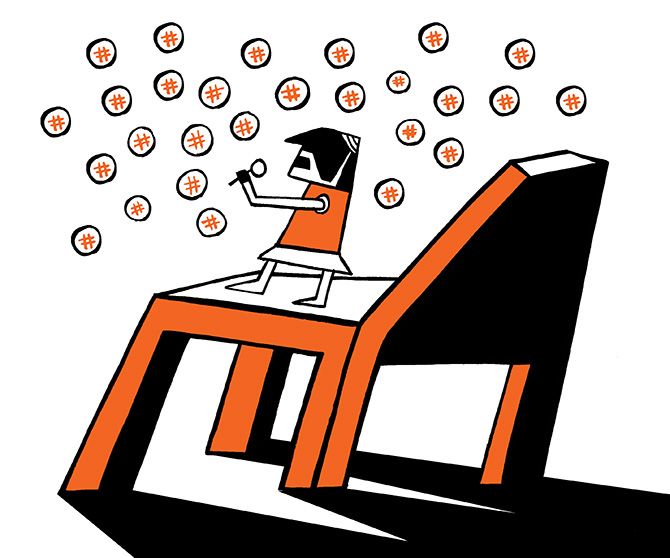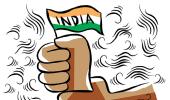'The BJP's election campaign promise of development isn't dead, it just doesn't look anything like what was promised.'
'The results are plain to see, which is why so many of us wake up with a knot in our stomachs, wondering what fresh new hell the day's news cycle will bring,' says Mitali Saran.
Illustration: Uttam Ghosh/Rediff.com

As the BJP celebrated its foundation day on April 6 under the fake trend hashtag #IndiaTrustsBJP, to the sound of hollow laughter on social media, citizens are still hunting behind their curtains and under their beds for vikas.
Has anyone seen it? Maybe it's just misplaced.
Or did it step out of the room for a minute?
Is it okay? Has the worst happened?
Just tell us, already.
The worst has indeed happened: Vikas is here.
The BJP's election campaign promise of development isn't dead, it just doesn't look anything like what was promised, because the meaning of development has undergone a painful surgery (now in its fourth year and likely to continue unless we can find another surgeon).
The results are plain to see, which is why so many of us wake up with a knot in our stomachs, wondering what fresh new hell the day's news cycle will bring.
The suspense is only in the details -- we already know the larger picture will involve destroying every institution, from academia to Parliament to the judiciary to the media; tech-heavy attempts to manipulate people for money and power; and religion, ever more menacing religion.
Development in New India now looks like the train wreck called Aadhaar, in the service of which the UIDAI is misleading the public and the attorney general of India is misleading the court.
It looks like the government scraping together a claim of economic success by fiddling the way it measures things like GDP growth and kilometres of road built.
It looks like fake news sites retweeted by government officials, and poisonous WhatsApp forwards created and disseminated by political IT cells.
Development looks like godmen getting Cabinet minister status, in return for calling off protests.
It looks like huge statues and flagpoles and persecuted students.
It looks like a couple of big bangs that end in a billion whimpers; it looks like money bills, and disallowed no confidence motions.
It looks like lots of hastily built toilets without water or users.
It looks like India becoming the nation of the most unemployed in the world.
It looks like lots of hashtags about development.
Development looks remarkably like it cares for nothing as much as overt majoritarianism.
In other words, poor old vikas now looks a lot like plain old power. And it is incompetent and deceitful, and brazen about both.
And it is certainly not 'sabka saath', treating all citizens equally.
In its wake has come a wave of fear.
Social media warriors may have found their tongues to speak up against the shredding of our social fabric, call out lies, and resist hatred, but people in the real world face more than poorly spelled tweets.
Most of us are not subject to the same danger to our livelihoods and physical and emotional well-being, and it is easy to underestimate what it is like to live not just with fear, but with the humiliation and rejection of knowing that you are around on sufferance and that if you do not subdue yourself, you will be subdued perforce.
It's bad enough that people turn against each other. It might be nice to know, when you're at the receiving end of a beating, that someone in the watching crowd feels bad for you.
But when the State itself proves hostile to some citizens, empathy is not enough.
Solidarity is for showing.
During the 1984 anti-Sikh riots, the father of a friend of mine urged his Sikh neighbours to pack a few things and drive to safety in Punjab.
Then he dressed in his army uniform, unholstered his service weapon, and stood in the doorway of that neighbour's house, facing down a mob that had come to loot and burn the place.
He told them that he would put a bullet in the head of the first person to take a step into the house, and that if they took him down, he would take a few of them down with him.
The mob fell silent, then dispersed.
There are endless stories of ways in which people come through for each other in times of crisis, and they all involve putting something on the line.
Today, you can both hurt and protect people without getting physical -- with the touch of a keyboard, a few phone calls, the press of an EVM button.
But then again, it could be physical.
Trust is the first casualty of social polarisation. One often assumes that the people whom you would happily help, know that they can lean on you.
But do they? There's no harm reaching out to them in advance, to offer and assure them safe harbour should they ever need it.
Because it may come to that.
Development is mostly just a hashtag. Solidarity cannot be.












 © 2025
© 2025